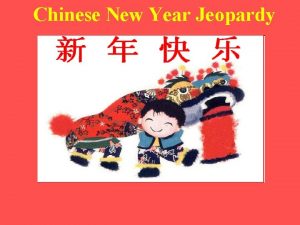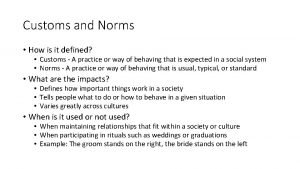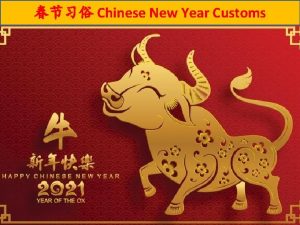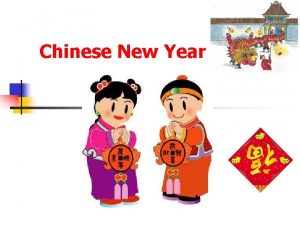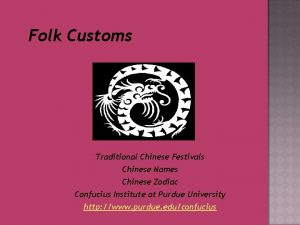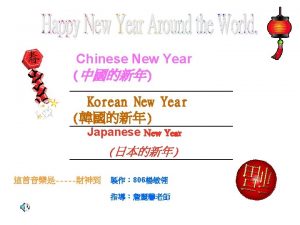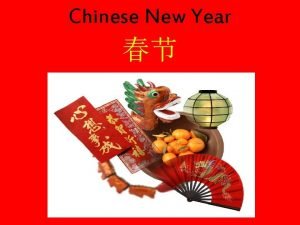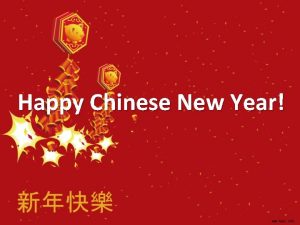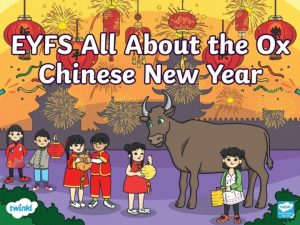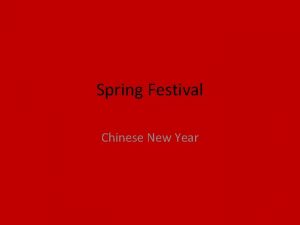Chinese New Year Customs Chinese New Year Eve















- Slides: 15

春节习俗 Chinese New Year Customs

Chinese New Year Eve: Family's reunion dinner Chinese New Year’s Eve, which falls on the last day of a year according to Chinese lunar calendar, is called "Chu Xi" in Chinese. People in the north eat dumplings at this eve while people in the south eat “Nian Gao” (meaning Year Cake).

Day 1: Celebrates the Beginning of the year On the morning of the first day of Spring Festival, families first set off some firecrackers before going out, in order to drive away evil spirits. In ancient times, the most important thing for Chinese on this day was to "bài nián" (拜年, to wish a happy New Year) – people paid visits to relatives, friends, and neighbours, and to people of the older generations

Day 2: Visiting friends and relatives The second day of the Chinese New Year is known as “Kai Nian 开年”, meaning the beginning of a year. People offer sacrifices to the God of Fortune hoping he can give them a great fortune in the coming year. The second day of the Chinese New Year is also the day to welcome sons-in-law. On this day, married daughters will visit the parental home with their husbands.

Day 3: Staying at home On the third day of the Chinese New Year, people usually don’t go out for visiting. It is generally accepted that this day is not a good day to socialize or visit relatives and friends. The third day of the Chinese New Year is an ominous day, so there are many other things people are forbidden to do according to the traditional custom.

Day 4: Welcoming the Gods The fourth day of the Chinese New Year is the day to welcome the kitchen god, the god of fortune and other gods. Families should prepare abundant fruits, burn incense and light candles to welcome the gods. On the fourth day of the Chinese New Year, families can finally clean their house. They collect all the rubbish to one place and throw them all, which symbolize that they throw away all the bad luck and possible poverty of this year.

Day 5: Celebrating the Festival of Po Wu The fifth day of the Chinese New Year is known as the Festival of Po Wu 破五. According to the traditional customs, it is believed that many taboos can be broken on this day. This day is the birthday of the god of fortune. People will celebrate this day with a large banquet and firecrackers in the attempt to get the attention of the god of fortune.

Day 6: Driving away the Ghost of Poverty On the sixth day of the Chinese New Year , according to traditional customs, families usually send away the ghost of poverty on this day. Usually, people will throw away their ragged clothes, rubbish and other dirty things. In addition, they will also light some candles to lighten the road for the ghost of poverty.

Day 7: Celebrating the Day of the Mankind The seventh day of the Chinese New Year is commonly referred to the day of human, because according to the legend, Nv Wa 女娲 ( a Goddess in Chinese mythology who is believed to create the world and human beings) created human beings on the seventh day. On this day, people have different ways to celebrate the creation of human beings. In ancient times, some ladies and scholars would go for a spring outing on this day.

Day 8: Celebrating the Creation of Millet The eighth day of the Chinese New Year is believed to be the birthday of millet, an important crop in ancient China. According to the folk proverbs, if this day is bright and clear, then this whole year will be a harvest year; however, if this day is cloudy or even rainy, then the whole year will suffer from poor harvest.

Day 9: Celebrating the Birthday of the Jade Emperor The ninth day of the Chinese New Year is the birthday of the Jade Emperor (the Supreme Deity of Taoism). According to Taoist legend, all the deities of the heaven and the earth will celebrate this day. And there will be grand ceremonies in Taoist temples on this day.

Day 10: Celebrating the Birthday of the God of Stone In the ancient times, the tenth day of the Chinese New Year is the day to celebrate the marriage of the mouse. According to the legends mouse is a harmful and unlucky animal, so people have to get the mouse married off to ensure a peaceful and lucky new year. On this day, families should not open any boxes or cabinets, and will go to bed early, in case that they may disturb the mice. New Year pictures and paper-cutting about the marriage of mice are popular among folk people in China.

Day 11: Fathers-in-Law entertaining Sons-in-Law The eleventh day of the Chinese New Year is for fathers-inlaw to entertain sons-in-law. In Binyang County, Guangxi Province, the eleventh day of the Chinese New Year is the Dragon Dance Festival. The dancing dragon there is larger than other dancing dragons. It is about 40 meters long. The shorter dragons have 7 sections while the longer ones have 11 sections. One of the unique features of the dragon dance in Binyang is that the dragon dancing is accompanied by firecrackers along the streets.

Day 12 - 14: Preparing for the Lantern Festival Families buy lanterns and build a lantern shack to prepare for the Lantern Festival.

Day 15: Celebrating the Lantern Festival The fifteenth day of the Chinese New Year is also celebrated as Yuan Xiao Jie 元宵节 (Yuan Xiao is glutinous rice dumpling) or Shang Yuan Jie, or in English Lantern Festival. This day is celebrated with dragon dancing and lion dancing parades in the streets and lighting many colorful lanterns. There are riddles on some lanterns for people to guess. Yuan Xiao is essential on Yuan Xiao Jie. It is a symbol of reunion in Chinese culture.
 Insw pib tracking
Insw pib tracking Autonumy
Autonumy Chinese new year food quiz
Chinese new year food quiz New year jeopardy
New year jeopardy You born
You born Chinese new year legend
Chinese new year legend Primary 2 malay worksheets
Primary 2 malay worksheets Unit 4 customs and traditions
Unit 4 customs and traditions Tiep
Tiep Section 32 customs act
Section 32 customs act Vasp customs
Vasp customs Every nation has its customs and traditions
Every nation has its customs and traditions Pga review customs
Pga review customs Norms and customs
Norms and customs Pakistan greeting customs
Pakistan greeting customs Assessment of duty
Assessment of duty



